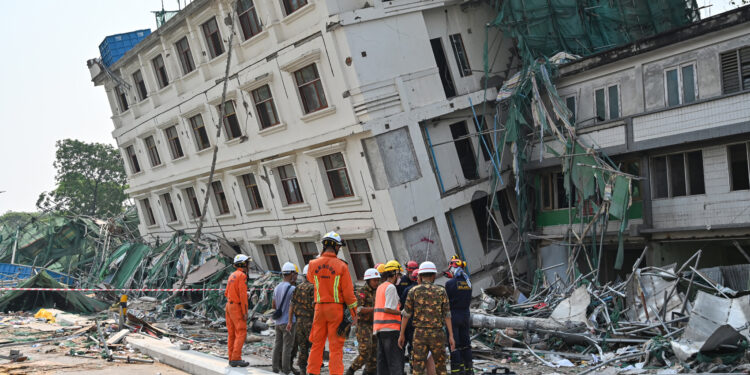Since the devastating 7.7 magnitude earthquake on March 28, the international community, particularly neighboring countries, has rushed to provide relief. India and China competitively boosted their visibility in the name “disaster diplomacy” to win the hearts and minds of Myanmar people. The UN and INGOs, who had been forced into silence about the civil war that has affected millions of people since the coup, resurfaced on the streets of central Myanmar. Even UN Special Envoy Julie Bishop toured the wreckage and preached peace to the Myanmar people.
The international community and neighboring countries tried to push for a larger peacebuilding goal by using relief efforts as a window of opportunity. The UN has called for an additional US$240 million in aid while urging a ceasefire to allow humanitarian efforts to proceed. This dynamic peaked in Malaysia’s recent diplomatic efforts, where Prime Minister Anwar Ibrahim met with both Myanmar’s National Unity Government (NUG) and the junta to discuss humanitarian assistance and regional stability.
The Myanmar military responded to international pressure by announcing a ceasefire, but that was nothing more than a ruse to manipulate diplomatic efforts. Its calculated deception not only exposes the hollowness of diplomatic engagements under such conditions but also underscores the fundamental flaws in the international community’s reliance on disaster response as a conduit for political negotiation.
Eternal recurrence
Disasters often spark optimism that they might create openings for diplomatic engagement between conflicting parties, whether rival states or internal factions. Proponents of disaster diplomacy suggest that while earthquakes, floods, hurricanes, and tsunamis bring devastation, they also present rare moments for cooperation—even among adversaries. While empirical studies confirm a link between disasters and conflict dynamics, the actual causal relationship remains complex and unpredictable. Aid can provide immediate relief, but it also risks reinforcing existing power structures, allowing authoritarian regimes to manipulate humanitarian efforts for their own benefit.
To understand how disaster diplomacy operates in Myanmar, we must bear in mind the military’s longstanding neglect of its people. The military has consistently demonstrated an utter disregard for civilian welfare, prioritizing power consolidation over governance. From the brutal crackdowns against protesters in 1988 to the ethnic cleansing campaigns against the Rohingya, the military has made it clear that its citizens are expendable.
Even in times of natural disaster, the military’s callousness is striking. The response to Cyclone Nargis in 2008 is an infamous example. While the cyclone claimed nearly 140,000 lives, the junta obstructed international relief efforts, prioritizing regime stability over urgent aid distribution. The world watched in horror as the government tightened its grip rather than facilitating humanitarian interventions, exposing its absolute disregard for human suffering. In his book “Disaster Diplomacy: How Disasters Affect Peace and Conflict,” Ilan Kelman sharply summarized the situation: “The May 2008 disaster shows that disaster diplomacy succumbs to priorities rather than dealing properly with disasters and creating diplomacy.”
Seventeen years later, the international community again hopes against hope that the same military will act in the interest of affected populations.
In addition, Myanmar’s junta is infamous for misusing aid. It has strategically used foreign aid to bolster its legitimacy, selectively accepting assistance while controlling narratives to reinforce its authority. Rather than prioritizing humanitarian relief, the junta manipulates aid delivery, restricting access to opposition-held areas and prioritizing its own interests. A recent OCHA assessment showed that Naypyitaw received more aid than any other region. Photos of scattered aid goods are widely spread online. But regardless of those actions, the crisis has led to renewed diplomatic engagement, with junta chief Min Aung Hlaing attending the recent Bay of Bengal Initiative for Multi-Sectoral Technical and Economic Cooperation summit in Bangkok, while ASEAN rhetorized regional cooperation in Myanmar’s relief efforts.
Escalating airstrikes: the junta’s true priorities
Even as thousands grapple with the aftermath of the earthquake, the junta has intensified aerial attacks against resistance strongholds and ethnic communities. As many as 611 airstrikes have been documented since the quake, killing more than 400 people and injuring more than 850 as of early May.
The intent is self-evident: the junta seeks to crush opposition while using the humanitarian crisis as a distraction. Instead of allocating resources to assist those affected by the earthquake, it directs its focus and resources toward fighting the resistance. International attention may temporarily pivot toward relief efforts, but the long-term suffering of Myanmar’s people—due to dual crises of natural disasters and conflict—continues unabated.
Empty gestures
The international community’s response to the earthquake must extend beyond symbolic gestures of aid. While humanitarian assistance is crucial, engaging with the junta solely through disaster diplomacy risks legitimizing its rule. External actors must recognize that providing relief without holding the military accountable for ongoing atrocities merely reinforces existing power structures.
Instead, diplomatic efforts should address the root causes of Myanmar’s suffering—demanding accountability for war crimes, amplifying resistance voices, and ensuring that aid reaches the people, not the hands of an oppressive regime.
While the earthquake has created a temporary window for increased humanitarian engagement and some diplomatic movement, all the underlying causes remain unchallenged. The international community’s approach remains largely transactional—offering aid while sidestepping deeper structural issues. Another disaster, another cycle of empty gestures. But the international community has failed Myanmar not because of ignorance, but because of convenience. It is failing by choice.
Disaster diplomacy is, at best, a scripted performance—a well-rehearsed exchange of pleasantries, photo ops, social media posting, and aid shipments designed to preserve a narrative of benevolence. The neighbors rush in with relief, the headlines praise their goodwill, and the world looks away, content in the illusion that something has been done. Without motivation to touch the structural causes, Myanmar will remain trapped in this cycle.
Desmond is a Myanmar analyst of international development focusing on the peace process and transition.

















